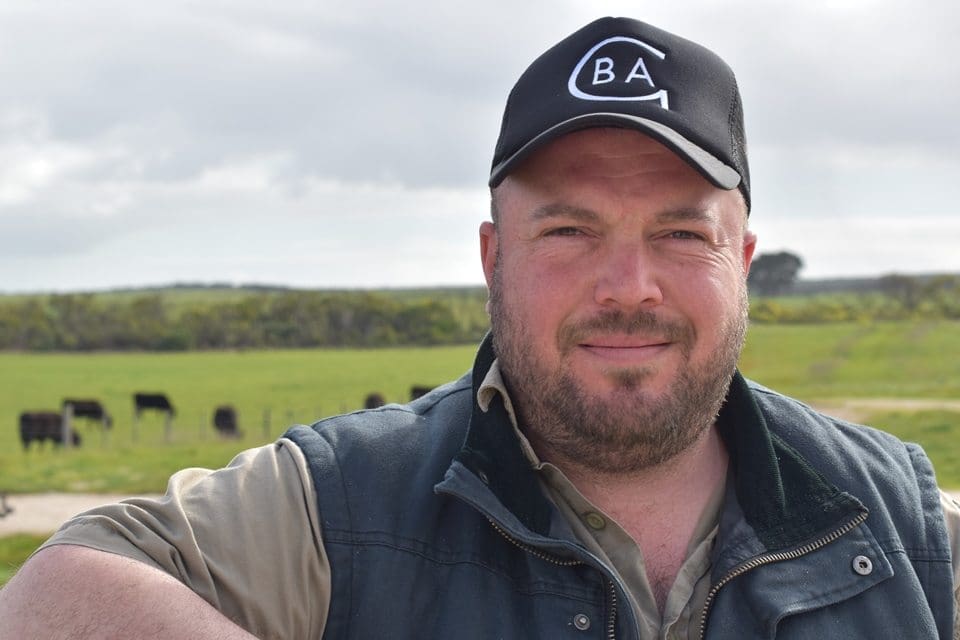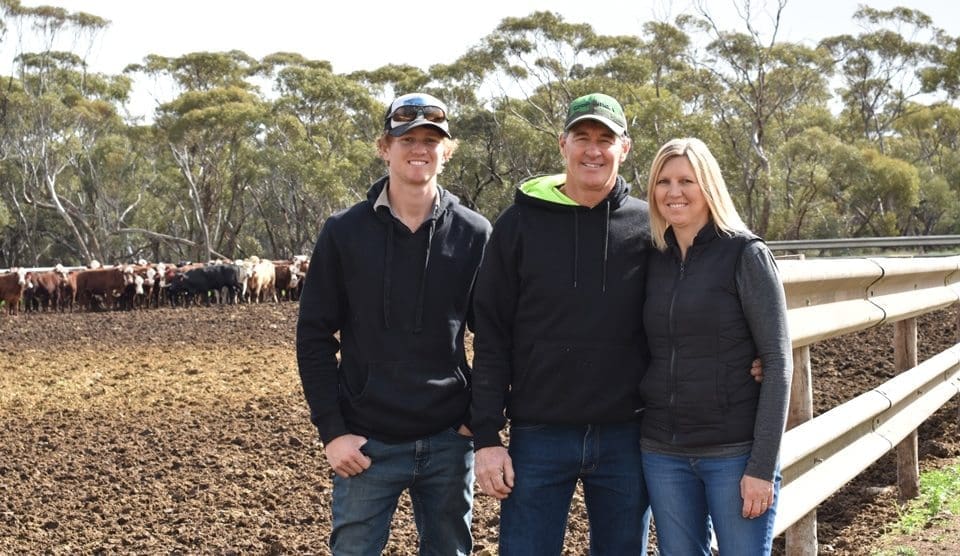
Michael Famularo, Blue Lake Station, Kongorong.
BEEF producers from southern regions of South Australia have taken out the top awards at the 2017 Meat Standards Australia Excellence in Eating Quality Awards for the state, presented at Gawler last night.
The awards recognise producers who have achieved outstanding compliance rates to MSA specifications, as well as high eating quality, as represented by MSA Index results for beef carcases graded during the 2015-16 and 2016-17 financial years.
Mt Gambier producers Michael Famularo and James Sackl, Blue Lake Station, Kongorong, earned the Most Outstanding Beef Producers award.
Located close to the Southern Ocean in the coastal area of Wandearah, Lynton and Sonia Joyce, Englefield Grange feedlot, were announced as SA’s most outstanding grainfed beef producers. Cattle from feedlots accredited under the National Feedlot Accreditation Scheme that met the Australian Grainfed Standards were included in this category.
Millicent beef producer, Leigh Clifford, Gowan Brae, received the inaugural MSA Excellence in Eating Quality Progress Award for South Australia for showing the greatest improvement in his MSA results since the 2014-15 financial year.

Lynton and Sonia Joyce and son Sam, Englefield Grange feedlot, Wandearah.
MSA program manager Sarah Strachan said the awards recognised the outstanding commitment by the producers for turning off cattle that consistently achieved exceptional compliance rates to MSA’s strict specifications.
“To help with continuously improving eating quality, MSA-registered producers are provided with ongoing feedback on their livestock, accessible through myMSA, which now offers producers the ability to benchmark their performance against other producers in the state as well. These producers are showing they are taking notice of that information to achieve results,” Ms Strachan said.
Blue Lake Station won the title from a field comprising 759 registered MSA producers in South Australia who consigned cattle during 2015-17. During 2015-17, 35pc of all cattle consigned to MSA from South Australia were grainfed. Throughout Australia, more than 14,000 producers consigned almost 5.9 million cattle to the MSA program during 2015-17.
To be eligible for the awards, a producer’s annual MSA-graded volume had to be equal to or above the average volume consigned for the state in which they were produced.
Each producer that met the eligibility criteria received a score out of 100 weighted on two factors – the compliance to MSA minimum requirements, and eating quality performance as determined by the MSA Index for cattle consigned to MSA in 2015-16 and 2016-17 financial years.
The Awards aim to raise awareness of best management practice from producers who consistently deliver high eating quality beef in their state ultimately for the benefit of consumers and for the profitability of the industry.
Blue Lake makes massive strides in three years
IT’S only been in operation for three years, but Blue Lake Station at Kongorong is already building a reputation for supplying premium beef to the domestic market with a focus on environmentally sustainable production systems.
Last night, Blue Lake’s owners, Michael Famularo and James Sackl, of Golden Triangle Meats, were recognised for their efforts when they won the 2017 MSA Excellence in Eating Quality award. The award recognised any production system, with the exclusion of accredited grainfed beef, which achieved the highest combination of compliance to MSA requirements and eating quality performance as represented by the MSA Index.
Mr Famularo said a focus on breeding for temperament and ensuring low-stress handling in all operations were the key reasons why their beef consistently met MSA minimum requirements and measures for top eating quality at processing.
“Our aim is to consistently produce top quality beef for consumers while employing a sustainable system,” he said.
Mr Famularo and Mr Sackl run an Angus breeding herd on the property where they have also built an undercover feeding facility for finishing cattle.
They have a medium-term goal of establishing their own brand and integrated vertical supply chain that includes online sales to anywhere in the world.
Currently, they aim to turn off 1600 Angus steers annually from their own herd, bought-in cattle and cattle that are contract fed for clients.
Mr Famularo said the most important factor effecting meat eating quality was reducing animal stress and at Blue Lake Station a keen watch was kept on the meat ultimate pH feedback to gauge the stress levels of the cattle.
“To date, we are meeting the requirements for MSA for meat pH and this has reinforced the value of using low-stress handling, especially right before transport, and providing cattle with extra minerals in the two weeks before they leave the property. It might be a cliché, but I think having happy cattle is the key to our MSA results.”
Mr Famularo said Blue Lake Station’s Angus herd was based on genetics from the Glatz Angus stud, which had a breeding emphasis on temperament.
Calving occurred on improved phalaris and ryegrass pastures, where calves also had access to extra protein and grain supplements from three weeks of age and stress could be taken off cows.
“We sell in a direct supply arrangement to Coles supermarkets at a liveweight of 580kg to 625kg,” Mr Famularo said.
“We supplementary feed the calves in the paddock to set the rumen up for the best potential feed conversion efficiency and easy transition to the feedlot.”
Maintaining good herd health was also vital. All vaccinations are kept up-to-date and mineral supplements provided to avoid any deficiencies. We joined MSA because we wanted a genuine, unbiased rating system to measure and monitor our cattle performance in meeting our expectations and those of the market,” Mr Famularo said.
“The MSA system identifies where we are doing well. But if there is even an issue highlighted by the MSA results, we want to be able to trace that back to a particular feed or point in time.”
For the future, the aim is to operate a fully sustainable production system for supply of premium beef – under the Blue Lake Station brand – to Australia and the world.
In order to do this, Blue Lake Station has built an enclosed feedlot that is currently working towards accreditation with National Feedlot Accreditation Scheme so it will be able to produce beef under the Australian Standards for Grainfed beef.
The yard holds 400 head with surrounding paddocks supporting the backgrounding of weaners.
Mr Famularo said the costs of fully enclosing the Blue Lake Station feedlot were starting to be recouped in superior weight gains by cattle.
Already, Blue Lake recycles and re-uses its effluent with absorbent bedding that is processed to compost, waste is recycled into protein for fish food and the feedlot uses solar power.
Photo caption: Michael Famularo, Blue Lake Station, Kongorong.
Englefield Grange wins MSA grainfed honours
LOCATED close to the Southern Ocean in the South Australian coastal area of Wandearah, mixed farmers Lynton and Sonia Joyce use opportunistic cattle trading for their 300-head capacity feedlot.
To keep marketing options open, they became registered MSA producers in 2010 for their Englefield Grange feedlot.
During the past 12 months, the Joyce’s management practices and types of cattle finished resulted in the family being judged 2017 MSA Most Outstanding Grainfed Beef Producer.
The award for grainfed producers recognises feedlots accredited under NFAS that have produced cattle eligible for Australian Grainfed Beef Standards.
Mr Joyce said being part of the MSA system ensured cattle going through the feedlot could be sold into MSA-accredited processing facilities, including those of their preferred buyers, Austral Meat Adelaide and Woolworths supermarkets.
The feedlot is an integral part of the family’s 1600 hectare mixed cropping and grazing operation and turned off between 300 and 500 head of cattle annually.
“We produce broadacre winter crops and buy in cattle to graze on native saltbush, clovers and grasses, before moving them on to crop stubbles after harvest and then into the feedlot just after Christmas,” Mr Joyce said.
The feedlot consumes some of the barley and wheat gradings, as well as other grains bought locally, plus legumes and hay.
“The whole system is highly integrated and works well, reducing business risks and helping to optimise whole-farm profitability through diversity.”
Cattle typically spend 70-100 days in the feedlot, from late December to mid-April, and are then sold at weights around 450kg for Woolworths and about 420kg for Austral Meats, Adelaide.
By managing the nutrition of the cattle, the feedlot is able to ensure cattle consistently meet the MSA requirements. These include ensuring carcases have adequate fat coverage, a minimum of 3mm and the meat pH is below 5.71.
Mr Joyce said the preference was to source British breed stock, but the family often bought Bos Indicus types for finishing as well, predominantly from the saleyards in Dublin.
“We joined MSA as a requirement of our end market, but we have since found it to be highly beneficial in keeping a whole range of market access open to us,” Mr Joyce said.
“The system also provides valuable processor feedback about how cattle are performing in our feedlot for a range of eating quality traits. This allows us to keep track of different cattle breeds and sources that tend to do well to help shape our future buying decisions.”
Photo caption: Lynton and Sonia Joyce and son Sam, Englefield Grange feedlot, Wandearah.
The South Australian awards are the fifth of the MSA Excellence in Eating Quality Awards to be held throughout Australia and are being staged in conjunction with the ‘What Makes the Perfect MSA Index’ producer forums in each state.
